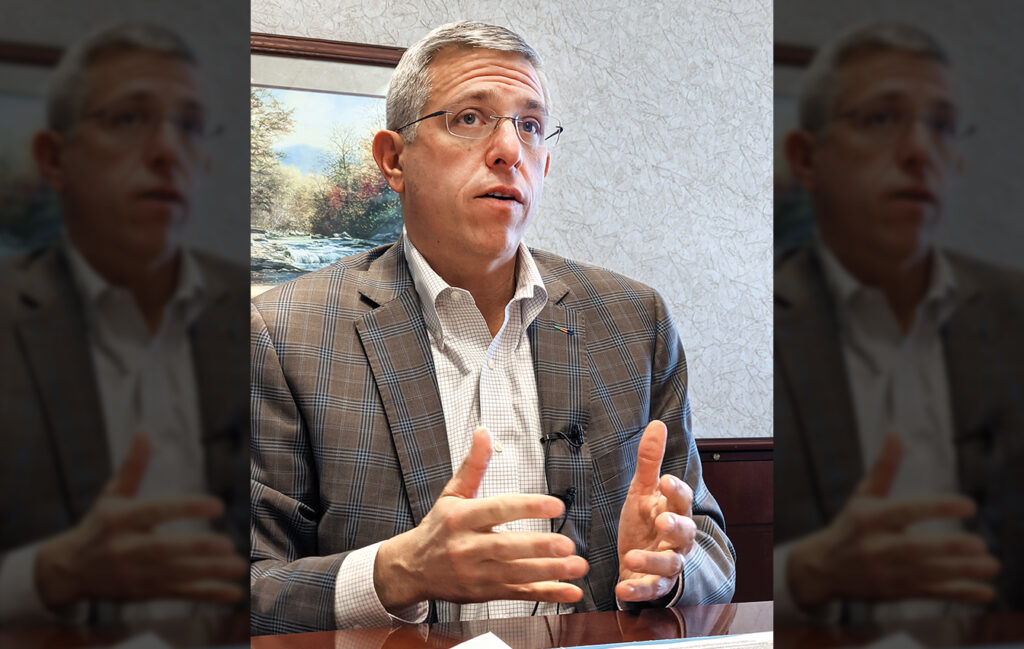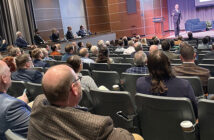
By A.J. Kaufman, Managing Editor
For our annual healthcare edition, “The Power of Healthcare”, the Business Journal had the opportunity to visit with Ballad Health Chairman and CEO Alan Levine for a wide-ranging interview on current topics. In his current role since Ballad’s February 2018 formation, Levine oversees operations of facilities in more than two-dozen counties and multiple states.
Business Journal: Quality indicators and performance data from recent years analyze Ballad’s services and ratings received. Many are higher than other state or regional hospitals. Tell me more about how these statistics were achieved.
Alan Levine: Even before COVID, we started investing heavily in nursing salaries because there had been projections of a massive nursing shortage coming…In August 2021, our nursing turnover spiked, and everything got backed up. We were one of the first health systems to do mass testing. We were one of the first to have refrigeration to do mass vaccinations. We did a lot to respond to the pandemic while at the same time, we’re dealing with a massive and sudden shortage of nurses.
Fast forward to Fiscal Year 2024, we’ve recovered on virtually all measures, and in six of the 11, we are among the top 10% performing hospitals in the country. And that’s not an accident. Now all our measures are at or better than expected.
What I see from the data is that we deteriorated so much, and now we’re top decile performing in the country. It tells me that everyone went backwards, and we seem to be recovering faster.
Three of our seven Southwest Virginia hospitals — Lonesome Pine, Norton, Smyth County — were named top 100 rural hospitals in the nation. There are so many data points supporting that, despite the headwinds, we provide a very high quality of care, which is ultimately the most important thing.
Our region has a lot to be proud of. Our hospitals are performing better than some of the best hospitals in the United States and better than the national average. What’s important is that each and every patient has a unique story, and we have to do the best we can to take care of them.
BJ: Regarding future healthcare manpower gaps and workforce opportunities across the Appalachian Highlands — particularly nursing — tell me about the Ballad Health Academy and your expectations for this educational initiative.
AL: We are not reacting to what’s in front of us; we are reacting to what’s three to four years down the road. We know this nursing shortage is not going away. Part of the Academy is to evaluate these kids’ aptitude and expose them to what the career opportunities are. They’ll have a special curriculum, so that while in high school, they can work as an unlicensed assistant and get hands-on experience, and then graduate high school with a high-quality LPN degree. We can hire them right out of high school. They don’t have to experience college debt…We’re trying to accelerate the pathways, so as these shortages keep hitting in the out years, we’ve got a pipeline that can backfill.
BJ: The increase in nurses’ pay of approximately 25% is also top of mind. How will this pay scale compare to UT Medical Center or Vanderbilt? We know the cost of living is lower here. Will this help with recruiting and retention?
AL: We are trying to stay ahead of the curve. The good news for our region is the cost of living is less, but we still must compete with their wages. We are very competitive with the health systems around us. The bottom line is this problem doesn’t get solved until we create more nurses.
What we’ve found when recruiting, if we can get somebody to come visit, they want to stay. I think too, the quality measures, the performance, the recognition our hospitals have received; these are good hospitals, and I think people want to be associated with success.
We take every criticism seriously. The reality is that …multiple data points here that demonstrate that Ballad’s hospitals are outperforming most of the hospitals in the U.S. And that’s good for everybody. That’s good for the people that live here who rely on the healthcare they receive. It’s good for economic development, for growth. We get a lot of compliments from people looking to relocate about the quality of the healthcare system here.
BJ: I understand you’re facing some challenges, notably rising labor costs related to nursing. What is Ballad doing to ensure that you’re still fiscally responsible and maintain itself as a leader in the region?
AL: One of the benefits of the merger was to eliminate the costly duplication of services. A rural region like this shouldn’t be spending $10 million extra a year to have two Level 1 trauma centers. It was irrational, and the region couldn’t afford it. By eliminating the duplication, you see better outcomes. Quantros named Johnson City Medical Center in the top 10% of hospitals in the nation for patient safety in trauma care in its 2023 CareChex® awards. The trauma center also received a perfect survey from the state during its last reaccreditation survey – the first time that had happened for any trauma center in this region.
Duplication of effort and pushing up the cost does not lead to better health care. Being more conscientious with resources is the responsible thing to do. Because we did all that, we achieved a lot of synergies from the merger. Our bond ratings improved. We are A rated with a stable outlook.
Before Covid, we did about $250 million a year in cash flow and our debt service was about $100 million; so we had about $150 million a year of free cash flow, and that’s what we funded our capital with…We’ve chosen to invest it in human capital over the last two years, as we invest in our nursing and other human resources so that we can continue to recruit and retain people. By reducing our cost structure, that gave us a runway.
One strategy has been to negotiate with the commercial insurers to get fair increases, so they cover their share of the cost of inflation. We recently renewed a contract with BlueCross BlueShield of Tennessee, and they gave us a very fair adjustment.
The second part of the strategy is we’re working at the state level to get the state to recognize there’s structural changes they can make in programs that would draw more federal money into Tennessee. I’m hoping during this legislative session we’ll see some movement on that. To their credit, the legislature understands the impact all this wage inflation has on hospitals. Almost every health system in Tennessee has been in the red the last two years.
BJ: Retirees also relocate to this area, in addition to young families. Ballad has opened several medical specialists’ services. Are there more on the way? Since the Tri-Cities has become popular with retirees, and their medical needs are greater, anything else on the horizon for seniors?
AL: We’ve now introduced the most advanced robotic surgery in all our major hospitals. When you’re a senior having some type of surgical procedure, we found with robotics that the risk of infection or complications is much lower. The investment in robotics has been a huge opportunity for us to elevate the care we provide. If you’re a senior citizen moving to the area, their No. 1 issue is healthcare.
We have a very interesting relationship with large physician practices. In some respects, they are competitors, but on the other hand are incredibly important partners to Ballad. They work hard to manage the care of the Medicare patient outside the hospitals to avoid hospitalizations. We reduced the rate of preventable hospitalizations by 50%. They are avoiding hospitalization because of all the work we are doing with our physician partners. It’s probably one of the important success points we’ve had.
(Note: Sullivan County recently had a large decline in preventable hospitalizations for the Medicare population and is now lower than Tennessee and national average.)
BJ: Anything else you wish to share with me, especially on future growth and overarching goals?
AL: There’s a new thing called a LifeFlow device, of which we are an early investor and have piloted with 410 Medical out of North Carolina. This device provides the ability to do rapid infusions. We started piloting this with pediatric patients and now we’re expanding to adult patients at our major hospital. This product is being commercialized all over the country and we own a piece of it.
We are leaning beyond the four walls of our hospitals. How do we invest capital in a way that helps improve health care for everyone but brings a return back to our region? Our region has a health system that’s being sought out by innovative people who are developing products that can help transform healthcare.
One of our north stars is to be a model rural health system. All of us want the region to grow in a good, positive way. We take our responsibility in that area very seriously. We are part of an important ecosystem here.
Additional background
Ballad recently invested over $33 million to raise starting wages for registered nurses. The initiative is a strategic response to the current shortage of nurses, even as the company has seen its nursing turnover rate return to pre-COVID levels. The new hourly rates coming in April range from $24 to $32 per hour, depending upon the hospital location. More than 5,500 current employees will receive raises. At the same time, Ballad will also invest roughly $30 million to establish 13 childcare centers for its employees. This is part of a larger effort to attract and retain talent, and ensure a stable workforce to provide quality care, as the healthcare landscape continues to evolve.



